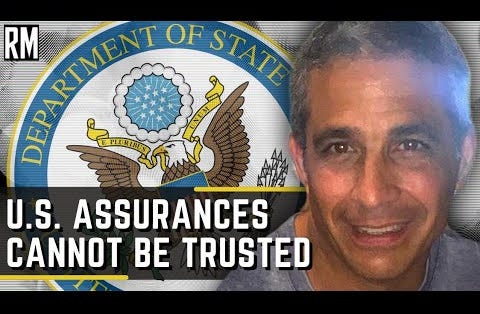High Court Says Assange Can Be Extradited to U.S.
The High Court ruled in favor of the United States, allowing it to appeal a UK judge's decision not to extradite Assange to the US. Accredited journalist Richard Medhurst reports.
The High Court handed down its judgement on the US appeal against Julian Assange. Richard Medhurst attended the hearing remotely, reporting live on the proceedings.
In January, district judge Vanessa Baraitser blocked Assange’s extradition to the United States on health grounds. She found that given Assange’s precarious mental state, extradition to the United States and imprisonment in oppressive conditions would result in a substantial risk the Australian journalist and WikiLeaks would take his own life.
In October, the United States appealed this decision on 5 grounds. Today, the High Court, ruled in the United States’ favor, dealing a huge blow to Assange. Lord Justice Timothy Holroyde delivered the Court’s ruling:
While it dismissed grounds 1, 3 and 4— accepting the medical evidence and the conclusion of the magistrate’s judge that an extradition would be oppressive— the Court allowed a US appeal to go ahead on grounds 2 and 5. Both grounds relate to diplomatic assurances offered by the United States.
The High Court ruled it was satisfied with the diplomatic assurances provided by the U.S. that Assange won't be placed at ADX or under Special Administrative Measures (SAMs) both pre-trial and after, if convicted.
Regarding ground 2 of the appeal, the Court found that the district judge should have notified the US of “her provisional view to afford it the opportunity of offering assurances to the court.”
Regarding ground 5, the Court ruled it was satisfied with the package of assurances, offered by the US in a diplomatic note on Feb 5th – a month after Baraitser blocked the extradition.
The US assurances appear to rule out confinement at ADX Florence or under SAMs. These assurances, however, are ambiguous and vague in their wording.
The United States says Assange will not be subject to SAMs or imprisoned at ADX unless “in the event that, after entry of this assurance, he was to commit any future act that met the test for the imposition of a SAM pursuant to 28 C.F.R. §501.2 or §501.3.”. In the assurance itself, the US effectively maintains the right to impose SAMs on Assange at its discretion.
The other assurance is that Assange could serve a potential sentence in his home country Australia. Australia, however, would need to give prior consent to the transfer— something it has not done.
I recently published an article containing classified documents, revealing how the United States offered diplomatic assurances for the extradition of David Mendoza Herrarte, only to break them afterwards. Mendoza told me he expects the US will likely do the same to Assange.


The High Court’s entire ruling today was predicated on the assumption that US assurances can be trusted. Mendoza’s case is more important now than ever, as it casts serious doubts on the trustworthiness of such assurances. Richard Medhurst spoke with Mendoza about today’s High Court ruling.
The Court rejected various criticisms of these assurances on Assange’s behalf. It said it is satisfied that these guarantees can reconcile the concerns of Baraitser’s decision to block extradition. Regarding treatment, the diplomatic note said that while in US custody, Assange would receive medical care under recommendation of the prison physician.

The High Court ordered Assange’s case to be remitted to the magistrate’s court, where the district judge is directed to then send it to the Secretary of State Priti Patel.
Gary McKinnon faced extradition from the United Kingdom to the United States. When his case was sent to then Secretary of State Theresa May in 2012, she blocked his extradition. McKinnon is said to have perpetrated the biggest computer hack of all time.
In the eventuality Assange’s case landed on Priti Patel’s desk, it is highly unlikely she would him the same courtesy. She recently proposed changes to the Official Secrets Act that could see journalists facing up to 14 years in prison for publishing information that would damage “national security”.
In a statement following the judgement, Assange's solicitors said they would seek permission to appeal today’s decision to the Supreme Court: “The application to do so has to be made in writing within 14 days.
Any such appeal to the Supreme Court would relate to the question of the assurances. Appeals on other important questions, including questions of free speech and on the political motivation of the US extradition request, have yet to be considered by an appeal court.”
Assange is held at HMP Belmarsh, one of England’s toughest prisons. The High Court today quashed Baraitser’s ruling to discharge Assange. Lord Justice Holroyde declared “the respondent is remanded in custody”.
On International Human Rights Day, the English High Court agrees to extradite a renowned journalist, based on assurances from a country that has a history of violating them.
Richard Medhurst is an accredited journalist who has covered Julian Assange’s extradition since 2020.







